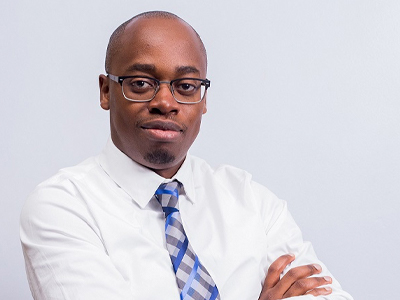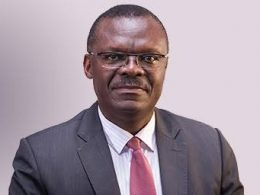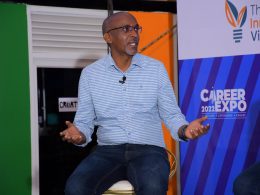By Mark Kawalya
Dr. Davis Musinguzi, the CEO of Rocket Health, is breaking barriers by changing how healthcare in Uganda is carried out. He believes there is a need for the traditional model to be simplified so that it can impact more people. “The process of queuing up, going for triage, seeing the doctor, going to the lab, taking the results back to the doctor, and finally getting a prescription takes about two hours or even more time in a busy health facility. With Rocket Health, patients can get an accurate diagnosis and treatment in a shorter period of time with everything done from the comfort of their home, office, or school.” He says.
But the accomplished entrepreneur wasn’t always a towering business figure. He goes back in time and talks about his childhood and the journey that led to him founding Rocket Health.
His early life and moving to the UK
Dr. Davis Musinguzi was born in Kampala to Polycarp and Lydia Musinguzi, who were two hard-working parents. His father was an economist and an academic who was more geared towards the educational side of things. His mother ran a business and leaned towards the street-smart side of things.
In 1988, Polycarp was accepted for a Ph.D. programme at the University of Southampton in the United Kingdom. He decided to move his family to the UK with him for the duration of his studies, and at that time, his parents had three sons. Davis was the middle child of the three, although later his parents would have two other children, bringing the total count to five children, with a daughter as the youngest.
The family later moved back to Uganda when Davis was about six years old, after his father finished his Ph.D. in Economics. “My earliest childhood memories were in the UK, where I remember collecting butterflies and keeping them in glass jars. I also remember my dad carrying me to kindergarten, where all we seemed to do was play and colour pictures, “he says.
The move back to Kampala
The young Davis experienced culture shock when he came back to Uganda and was enrolled at Buganda Road Primary School in an educational system that emphasised academics at a young age.
“Each stream had more than 100 children, which was quite surprising. I also couldn’t speak any of the local dialects and I had a bit of an accent, which made me a bit of an odd fish. “
Musinguzi had to hang onto one or two people that he could make a good friend out of. “One of the guys who was a good friend was Matovu Nicholas, who unfortunately passed away due to COVID-19 during the heat of the pandemic.”
For extracurricular activities, students used to play football at the back of the school, but Davis couldn’t play much.
“I started wearing glasses when I was about five. At the start, I was very playful. However, I toned this down after breaking my glasses a number of times, something which my parents made clear they were not amused about. As a result, I became more reserved and more meditative, focusing more on things like reading books. “
He later changed schools and moved to Lohana Academy, where he completed his primary education. He passed highly enough to go to St Mary’s College Kisubi (SMACK) for his ordinary level education. He made some lifelong friends from the school and credits the discipline he learned from the school for a lot of his work ethic.
Discovering who he was
Davis later got involved in rugby, which was the most popular sport in the school at the time, and it was also the first time he was actively playing a sport. “I was sort of moving into my own person and wanted to move away from board games like chess, which I was very good at playing. I learned a lot about things from rugby, like team work, practice, camaraderie, strategy, and facing adversaries, which I believe are important for adult living.”
From that time, about the age of twelve, Musinguzi, was interested in science. His mother gave him a book called ‘Think Big.’ by Ben Carson, the neurosurgeon. “What is interesting is that this book has the power to inspire any kid who reads it to become a neurosurgeon, and this wasn’t any different for me. I used to go to the library at SMACK and read A-level biology books on human anatomy and get into the sections that showed the cross sections of the human brain. “
This was the catalyst that fueled his interest in science subjects and ultimately led him to become a doctor. At that age, he was not fully aware of some of the challenges that doctors in Uganda face and was more interested in gaining the wealth of knowledge that pertains to how the body works. This was something that he found really exciting, along with the general pursuit of medicine.
However, as he was about to finish his fourth form, he got a real appreciation for the arts, which made him conflicted about the direction he should take. However, as he moved onto A levels, the curriculum necessitated him to either choose sciences or arts but had not provision for both.
For A levels, he moved from SMACK to Kings College Buddo. The rules were a little stringent at SMACK and he needed a bit more freedom so he could learn in an environment where he was more in control.
The move to university
He was later admitted to Makerere University for Medical School, which at the time needed very high points scored at the final A-Level exams to get admittance. To the delight of his parents, he got a government scholarship which covered his entire university tuition.
While in his second year, his father, got a job in the US with the International Monetary Fund, which presented an opportunity for the family to go along with him. His siblings took the opportunity to go with their father while he chose to stay and complete his course. As a result, he got to drive the family car, which was a cool thing to have while at university. He was relied upon to be the default driver by his friends whenever they were going out. He was introduced to Kampala’s social scene, although he took all this with a pinch of salt, staying focused on his ultimate goal, which was his medical education.
Despite this, he was also trying to make some money on the side. His parents had been involved in a network marketing company called GNLD since way back in 1996, supplying food supplements. He had taken a keen interest in nutrition and figured, with his medical background, he could advise people on the right supplements to take and make a business out of it. By his third year, he was making about UGX1,000,000 each month selling the supplements and had a team of about 100 people under him that he directly worked with.
As a result of this business, he learned public speaking and leadership skills, which he came to rely on later on in life. However, he later shifted his focus back to his medical studies since the business was taking too much of his time.
However, doctors at the time were earning about UGX800,000 or thereabouts, so his decision to focus on his medical degree was based on knowing he could make money along the way in the future.
Starting Rocket Health.
Later on, after graduating, Dr. Musinguzi was convinced there was a way that could make health care more effective in Uganda. While, in medical school, he realised that the health care system in Uganda was defective, and that it made no sense to try and become the best doctor who, at the end of the day, still had to work within the confines of a flawed health system.
In 2011, he tried to find ways that technology could be leveraged to streamline the health care system. “Technology was already being used in other fields, such as in human interaction through social media. I was looking for ways that it could be used to improve the healthcare system. “
He later realised that the mobile phone was used as a follow-up tool by doctors. Additionally, patients who had relatives working in the medical field used phones to inquire about medical issues they were facing. However, this was in an informal setting with no centralized method of structuring this process into a service that could be used to revolutionize an otherwise dated healthcare system.
This was the light bulb moment for Musinguzi. He realised that having a call centre that is manned by experienced doctors who are available 24 hours a day, 7 days a week could make it easier for potential patients to call in and get a consultation. The service would also provide a list of laboratories where patients could go for a lab test or have a lab technician visit their home and take the test. Additionally, the doctors would also write prescriptions for patients which they could fill out at a nearby pharmacy.
This is how Rocket Health started and was officially launched by 2013. Within the first 6 months, more than 7000 people had signed up and were using the service. To start the company, Davis teamed up with four other co-founders who also had a background in the medical field.
The Rocket Health, medical call centre is diversified in terms of languages a patient can use to suit the different ethnicities in Uganda, making it a well embraced service by people in rural areas who are unable to speak English. “It doesn’t matter if it is your 80-year-old grandmother who calls in to the service center. We are able to get a doctor who will attend to her in the dialect she best understands, “Dr. Musinguzi says.”
One of the main concerns of people regarding telemedicine is its ability for doctors to deliver an accurate diagnosis without doing a physical body exam like would be the case in a face to face meeting with a doctor. Dr. Davis says what has been discovered in the medical field over time is that taking a patient’s medical history is one of the best skillsets a doctor can have. This skill often leads to a more accurate diagnosis than anything else at a doctor’s disposal. He adds that a physical body exam is normally taken to confirm the diagnosis after a doctor has carried out a thorough investigation of the patient’s medical history. Interestingly, he notes that 70% of medical conditions can be diagnosed by taking a patient’s medical history.
Rocket Health has also trained its doctors to move from a bedside care mentality to a web based healthcare system making them more discerning to a patient’s symptoms. The team of doctors is also keen on figuring out whether a patient can be treated remotely or needs to come in to their clinic and see a doctor. Rocket Health fully understands that while some medical conditions can be diagnosed remotely, there are others that necessitate a visit to see a doctor.








